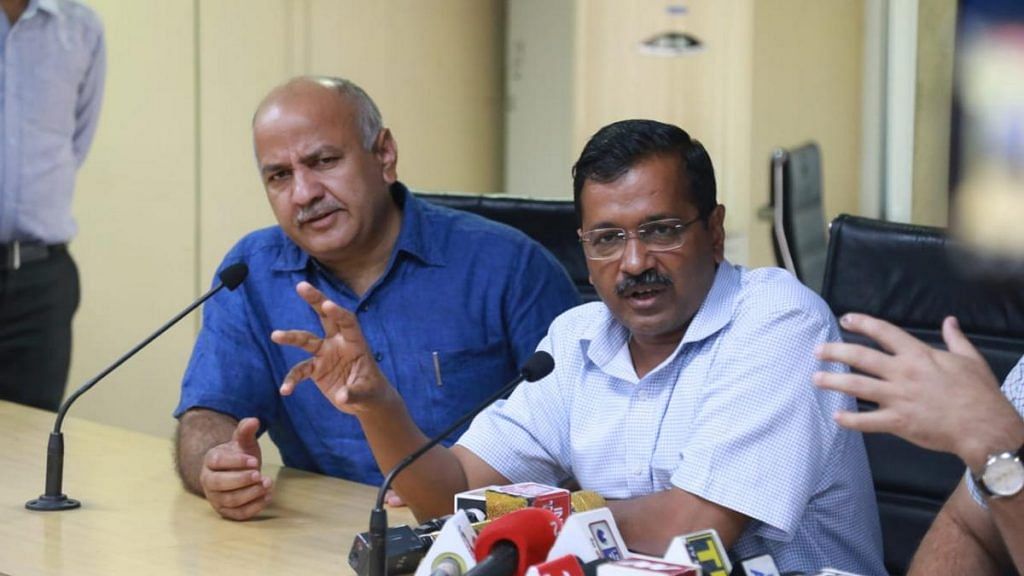New Delhi: Delhi Chief Minister Arvind Kejriwal Monday announced measures he said would improve women’s safety in the national capital — free bus and metro travel for women and the installation of nearly 2.8 lakh CCTV cameras.
“Women will be given free rides in DTC, cluster buses and the Delhi Metro. The government will bear their travel expenses,” Kejriwal said while addressing the media at the Delhi Secretariat.
The Aam Aadmi Party (AAP) government is yet to clearly state how the Delhi Metro decision will be implemented and has invited suggestions from people, while Kejriwal said he was working with the Delhi Metro Rail Corporation Board (DMRC) and his officers to formulate a plan.
It is the chief minister’s metro promise that will require some deft manoeuvring by the AAP government. The project to install CCTV cameras is already underway and is expected to be completed by November while the Delhi Transport Corporation, which handles state-run buses, falls under the Delhi government.
According to two former Delhi chief secretaries and a former Delhi assembly secretary ThePrint spoke to, the chief minister will have to contend with two main issues — funds and the DMRC, which is a joint venture between the Central and Delhi governments.
So far, the DMRC said it has received no such communication from the Delhi government.
“We have not yet received any official communication from the Delhi government or the senior management,” DMRC spokesperson Anuj Dayal told the ThePrint.
Limited control over financial matters
The chief minister estimates that about Rs 700 to Rs 800 crore will be spent by the AAP government to sponsor the travel of women commuters for the remainder of the year. The Delhi government, however, does not have complete control over financial matters since it has to refer them to the Lieutenant Governor (LG), who is appointed by the central government, for approval.
But according to former Delhi chief secretary Omesh Sehgal, he will be hard pressed to find the money.
“The budget has already been passed and is earmarked for specific departments. Even if the government has savings, it can’t just move the money,” Sehgal told ThePrint. “You can’t break all the rules just because you’re the ruling party.”
Rakesh Mehta, another former Delhi chief secretary, concurred with Sehgal on Delhi not having complete discretion over financial matters. “He (Kejriwal) can call another assembly session, but then again, the budget will have to be approved by the LG,” Mehta said. “I doubt he (LG) will do that.”
S.K. Sharma, the former Delhi assembly secretary, said that there are, however, two options.
“If they want to withdraw the amount as additional expenditure, outside the ambit of the budget from the Consolidated Fund of Delhi, they will need approval from the central government,” he said. “The other way is to do it internally — by switching heads in the budget. But that too requires the permission of the competent authority, the LG”
The DMRC board and system
Another problem for the Delhi government is securing approval from the DMRC board, said Mehta.
The DMRC has a 13-member board of directors that takes a call on the Delhi Metro’s affairs. It is headed by the secretary, housing and the urban affairs ministry.
“Why would the DMRC chairman agree to something that is just a poll promise and may result in near total loss? The final call will rest with him,” Mehta said. “The vote, considering that, is tilted in the centre’s favour.”
The perfect example of this, Mehta said, was Kejriwal’s inability to stop the fare hike in the metro.
But Sehgal believes that the Delhi Metro system itself can’t accommodate such a move. “In buses you have conductors; Delhi Metro’s system is gender-neutral,” Sehgal said. “The equipment can’t distinguish between a man and a woman. What will prevent its misuse if a woman buys a ticket and a man uses it?”
A source in the DMRC told ThePrint that technical problems can always be worked out. However, he also believes that the move has the potential to spiral beyond control since it can be widely misused.
Also read: Arvind Kejriwal has hit the streets again but not to become PM of India
